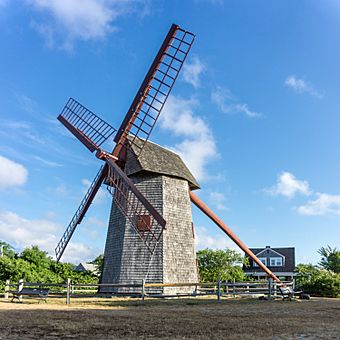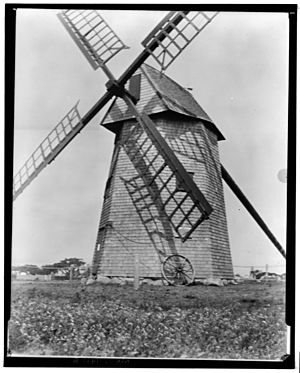The Old Mill (Nantucket, Massachusetts) facts for kids
Quick facts for kids |
|
|
The Old Mill
|
|
|
U.S. National Historic Landmark District
Contributing Property |
|

A photo of the mill from 2015
|
|
| Location | Nantucket, Massachusetts |
|---|---|
| Area | Nantucket Historic District |
| Built | 1746 |
| Website | https://www.nha.org/sites/oldmill.html |
| NRHP reference No. | 66000772 |
| Added to NRHP | 1966 |
The Old Mill is a special historic windmill in Nantucket, Massachusetts. It was built way back in 1746, making it the oldest windmill in the United States that still works! Today, it's a museum run by the Nantucket Historical Association.
The mill is an important part of the Nantucket Historic District. In 1992, it was also named a Historic Mechanical Engineering Landmark because of its clever design.
Contents
History of the Mill
The Old Mill is the last of four windmills that once stood on the hills of Nantucket. It is a special type of windmill called a smock mill. This means it has a fixed body and a top part, or "cap," that can turn.
A Unique Beginning
A sailor named Nathan Wilbur built the mill in 1746 after visiting Holland. He used strong oak beams that had washed up on the shore from shipwrecks. The whole structure is held together with wooden pins and pieces of scrap metal.
Changing Owners
In 1828, the mill was sold to a carpenter named Jared Gardner for only twenty dollars. It was in very bad shape. Instead of taking it apart, Gardner fixed it up so it could grind corn again.
The mill was sold again in 1866 to John Francis Sylvia. He ran it for many years, but it stopped being used in 1892. Five years later, in 1897, a woman named Caroline French bought the mill for $850. She kindly gave it to the Nantucket Historical Association, which takes care of it today.
How The Old Mill Works
The Old Mill stands 50 feet (about 15 meters) tall. Its four large sails, called vanes, are each 30 feet (about 9 meters) long.
Turning Wind into Power
The top cap of the mill can be turned so the sails always face the wind. When the wind blows, the sails spin. This turns a large driving wheel inside the top of the mill.
This wheel has wooden teeth, called cogs. The cogs connect with another set of teeth on a long vertical pole, or shaft. As the driving wheel spins, it makes the shaft spin, too.
To stop the powerful sails, the mill has a simple brake. It's a heavy oak beam that can be pressed against the spinning shaft. A rope and a box of heavy stones are used to control this brake.
Grinding the Corn
The spinning shaft turns a large, heavy grindstone. As this stone spins against a stationary stone below it, it grinds corn into cornmeal. The mill can make about 5 bushels of cornmeal every hour.
Today, visitors can go inside the mill. They can watch the amazing old gears work and see how corn was ground into meal hundreds of years ago.
 | Chris Smalls |
 | Fred Hampton |
 | Ralph Abernathy |


